#la ilaha illallah wahdahu la sharika lah
Text
youtube
adkar | dua, La ilaha illallah wahdahu la sharika lahu New Voice
#اذكار#adkar#أدعية#لا اله الا الله وحده لا شريك له#اذكار الصباح والمساء#holy quran#99 names of allah#hadith of the day#hadees in english#hadees sharif#hadith qudsi#allah names#نور ذكر الله#علاج السحر#islam#tasbeeh#اذكار الصباح#اذكار المساء#لا اله الا الله#dua#la ilaha illallah#la ilaha illallah wahdahu la sharika lah#La ilaha illallah wahdahu la sharika lahu#الصباح#Youtube
0 notes
Text
youtube
#رقية_شرعيه #الرقية_الشرعية #رقية_شرعية_شاملة_وقوية #رقية_شرعيه #الرقية_الشرعية
#قرآن_كريم #تلاوة_هادئة #بث_مباشر #قران_كريم_بصوت_جميل_جدا #قران_قبل_النوم #Quran #Sleep
#نور_ذكر_الله لا اله الا الله وحده لا شريك له adkar اذكار | أدعية هناك عدة أدعية و اذكار غير مخصصة لوقتٍ معين، هذه أدعية و الاذكار تصلح في أي وقتٍ أو زمنٍ ومن يتمسك يها فإنها تكون حماية له من الشرور ومن ضيق الصدر والهم والغم وكيد الشيطان فانصح اخوتي بالتمسك بها
قناة نور ذكر الله
ساعدنا علي الإستمرار في العطاء من خلال عمل مشاركة وكتابة تعليق و الاشتراك في قناة نور ذكر الله http://bit.ly/noorzhikrallah
لدعم القناة
https://www.patreon.com/noorzikrallah
لمزيد من الفيديوهات الإسلامية
اشترك معنا
https://goo.gl/zi8ZZF
اذكار,adkar,أدعية,لا اله الا الله وحده لا شريك له,اذكار الصباح والمساء,holy quran,hadees in english,hadees sharif,hadith qudsi,allah names,نور ذكر الله,علاج السحر,islam,tasbeeh,اذكار الصباح,اذكار المساء,لا اله الا الله,dua,la ilaha illallah,la ilaha illallah wahdahu la sharika lah,La ilaha illallah wahdahu la sharika lahu,الصباح,ادكار,adkar ramadan,adkar arafat,ادعيه,لا إله إلا الله وحده لا شريك له 1000 مرة,la ilaha illallah wahdahu
لا اله الا الله وحده لا شريك له ,
اشهد ان لا اله الا الله وحده لا شريك له ,
لا اله الا الله وحده لا شريك له احدا صمدا ,
لا اله الا الله وحده لا شريك له بالانجليزي ,
لا اله الا الله وحده لا شريك له قبل النوم ,
لا اله الا الله وحده لا شريك له له الملك ,
اجر قول لا اله الا الله وحده لا شريك له ,
فضل لا اله الا الله وحده لا شريك له ,
لا اله الا الله وحده لا شريك له مائة مرة ,
لا اله الا الله وحده لا شريك له يحيي ويميت,
#اذكار#adkar#أدعية#لا اله الا الله وحده لا شريك له#اذكار الصباح والمساء#holy quran#hadees in english#hadith qudsi#allah names#نور ذكر الله#islam#tasbeeh#اذكار الصباح#اذكار المساء#لا اله الا الله#dua#la ilaha illallah#la ilaha illallah wahdahu la sharika lah#La ilaha illallah wahdahu la sharika lahu#الصباح#ادكار#adkar ramadan#adkar arafat#ادعيه#لا إله إلا الله وحده لا شريك له 1000 مرة#la ilaha illallah wahdahu#لا اله الا الله وحده لا شريك له له الملك#Youtube
1 note
·
View note
Text
Ugh, I've been meaning to post about this doll for what feels like ages! Allergies have been pretty bad this week, but I've finally been able to pull myself together enough to post about Fulla's prayer dolls!

According to the Islamic blog Alhannah.com, "The purpose of a prayer outfit is twofold – to respect the sanctity of prayer by covering one’s ‘Awrah’ (parts of the body that should be covered in public) and to uphold the principles of modesty".
"A prayer outfit typically encompasses a long, loose-fitting skirt paired with a top that has a head covering (Hijab), collectively ensuring that the body remains concealed during prayer". The website also states that there are one-piece and two-piece versions of the outfit, the choice between the two often coming down to preference of the wearer (in this case, it seems Fulla prefers the latter)

Muslims pray five times per day: once in the morning before dawn (Fajr), once at midday (Dhuhr), once in the afternoon (Asr), once after sunset (Maghrib), and once in the evening (Isha).
As far as I can find, there have been three prayer dolls of Fulla released. Two are for the Fajr and Isha prayers respectively, and one is for a process connected to all five!
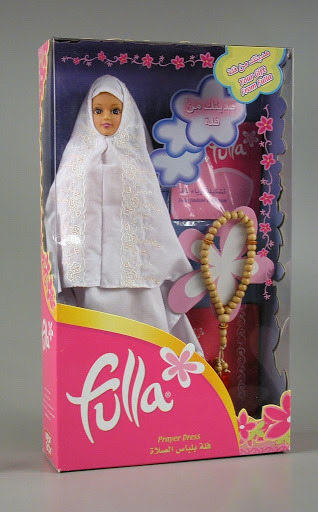
Fulla's first prayer doll was released in 2004 with a doll-sized prayer mat and prayer beads for yourself!
Prayer mats are used to ensure the ground is clean while praying. Prayer beads, meanwhile, are used for dhikr, a process of prayer recitation after each of the five daily prayers. The beads are typically counted for each of the 99 names of Allah recited, however with certain prayer beads consisting of 33 beads instead (such as the one included here) they are counted 3 times over. The first 33 recitations are "Subhan Allah" (Glory be to Allah), the second 33 are "Al-Ahamdulilah" (Praise be to God), and the final 33 are "Allahu Akbar" (God is greatest). After these you must pray "Laa ilaha illallah wahdahu la sharika lah lahul mulku wa lahul hamdu wa huwa ala kulli shay in qadir" (There is no god worthy of worship except Allah alone, with no partner or associate) once.
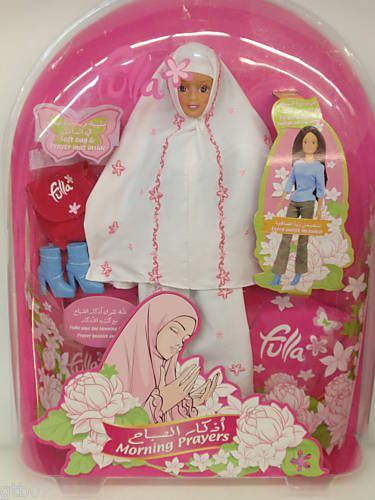
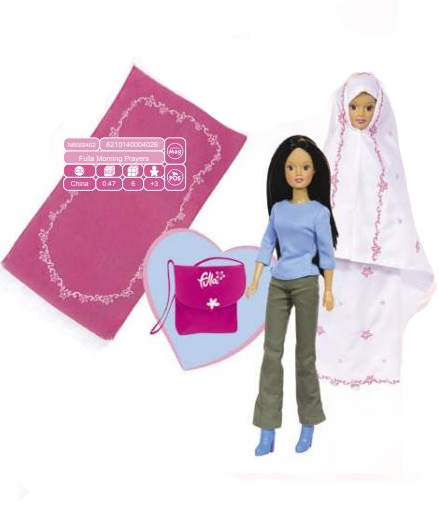
Her next prayer doll was released in 2006 for the Morning Prayer (Fajr)! While I can't definitively say the same for the prior Prayer Dress Fulla, this doll wears indoor clothes underneath her prayer outfit to start the day! She comes with a prayer mat and bag, and (it says on the box but its hard to read) a prayer booklet of the Morning Prayers! And I hadn't even known this until now for this doll or the next, but apparently there's a button on her back that makes her recite them (batteries included)!
I like how much the pink pops against the white! Although the outfit is decent, it looks a bit plain compared to her other indoor looks (although that could have been intentional). I don't have any particularly strong feelings on her fashion, but it's decent!
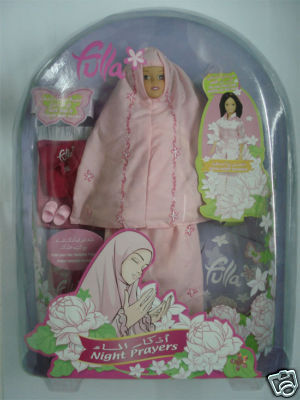
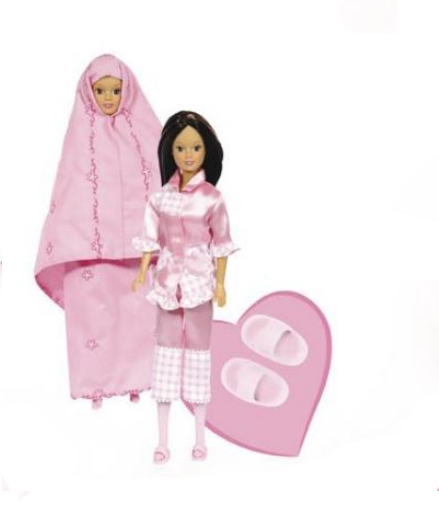
The same year a doll for the Night Prayers (Isha) was released as well! Underneath her prayer clothes she wears a pair of pink pajamas with gingham detailing, with matching pink slippers! It seems she also came with a prayer mat, bag, and booklet (this time for the Night Prayers) as the Morning Prayers Fulla did! And yes, she also has a button to make her pray them with you!
I love these pajamas so much, they're so cute!!! And the way they match her prayer outfit too??? Indoor-fashion-wise, I probably prefer this one over the Morning Prayer's indoor outfit.
Overall, I love how all of these dolls not only represent a significant Islamic religious practice, but encourage children to do it with her! Between the prayer beads and voice button, I can easily see this doll joining in prayer with her owner :)
And not too difficult to imagine either, since Fulla has also made officially branded prayer clothes in 2005, 2007, and as recent as 2024!

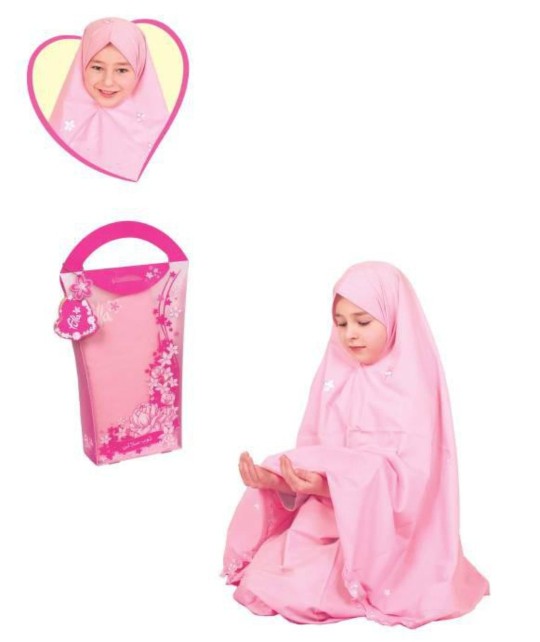

Anyway, I'm glad I was finally able to dive deep into this topic like I'd been meaning to look into for a while (now to get some sleep as it is currently 4am)
Ramadan Kareem!
227 notes
·
View notes
Text
*Aamal e Aarafa 9th Zilhujj*
👉 It is highly recommended to fast on 9th Zilhajj.
👉Do Ghusl
👉 Recite Ziyarat e I.Hussain (as) of the Day of Aarafa
👉 *2 rkt Namaz after Namze Asr*
1st Rakat S.Alhamd & Sure Kulhovallah 1 time
2nd rakat S.Alhamd & Sure Kaferoon 1 time
👉 *4 rakat Namaz (2x2)*
In each Rakat Sure Alhamd 1 time & Sure Kulhovallah 50 times
👉Dua e Aarafa if I.Hussain (as)
👉Dua No 47 of Sahifa Kamila
👉 *Recite 100 times each*
(a) Tasbeehate Arb'aa
(b) Sure Kulhovallah
(c) Ayatal Kursi
(d) Salawaat
👉 *Recite 10 times each*
(a) La ilaha illallah wahdahu la sharika lah, lahul mulko wa lahul hamd, yohyeey wa yomeeto and yomeeto wa yohyeey, wa huwa hayyul la yamoot, be yadehil khair, wa huwa ala kulle shayin qadeer
(b) Astaghfirullahal laze la ilaha illa huwal hayyul qayyoom, wa atubo ilaih
(c) Ya Allahu
(d) Ya Rahmaano
(e) Ya Raheemo
(f) Ya Badee’-as Samaawate Wal Arze Ya Zaljalale wal Ikram –
(g) Ya Hayyo Ya Qayyum
(h) YA Hannano Ya Mannan
(i) Ya lailaha illa anta
(j) Aameen
Then submit your needs and they will be granted, inshallah.
*🙏🏼 Pray for the early reappearance of Imam e Zamana (atfs)*
👉Recite Dua-e-Asharaat
For details of aamal go to
www.duas.org
(Ref. Mafateehul Jinaan)
2 notes
·
View notes
Text
The Six Kalimas: An Insightful Journey with Urdu Translations
The Six Kalimas hold a significant place in the Islamic faith as concise statements of faith, remembrance, and supplication. These Kalimas encapsulate fundamental beliefs, serving as a means to strengthen one's spiritual connection with Allah. In this article, we will explore the essence and meaning of each Kalima, alongside their Urdu translations, offering a comprehensive understanding of their significance.
First Kalima (Kalima Tayyab):
La ilaha illallah, Muhammadur Rasul Allah.
Translation (Urdu): لا الہ الا اللہ محمد رسول اللہ
The First Kalima, also known as the Kalima Tayyab, emphasizes the belief in the oneness of Allah and the prophethood of Muhammad (peace be upon him). It serves as the foundation of Islamic faith, affirming that there is no deity worthy of worship except Allah, and Muhammad is His final messenger.
Second Kalima (Kalima Shahadat):
Ashhadu an la ilaha illallah, wa ashhadu anna Muhammadan 'abduhu wa rasuluhu.
Translation (Urdu): اشھد ان لا الہ الا اللہ واشھد ان محمدا عبدہ و رسولہ
The Second Kalima, known as the Kalima Shahadat, reiterates the testimony of faith and the acceptance of Prophet Muhammad (peace be upon him) as Allah's servant and messenger. It serves as a public declaration of one's faith and acts as a reminder of the core principles of Islam.
Third Kalima (Kalima Tamjeed):
Subhan Allahi, walhamdu lillahi, wa la ilaha illallah, wallahu akbar, wa la hawla wa la quwwata illa billahil 'aliyyil 'azim.
Translation (Urdu): سبحان اللہ و الحمد للہ و لا الہ الا اللہ و اللہ اکبر و لا حول و لا قوۃ الا باللہ العلی العظیم
The Third Kalima, referred to as the Kalima Tamjeed, glorifies Allah and acknowledges His supreme attributes. It highlights the concepts of praise, recognition of His oneness, and the acknowledgment of His ultimate power and authority.
Fourth Kalima (Kalima Tawheed):
La ilaha illallah, wahdahu la sharika lah, lahul-mulku wa lahul-hamdu, yuhyi wa yumitu, wa huwa 'ala kulli shay'in qadir.
Translation (Urdu): لا الہ الا اللہ وحدہ لا شریک لہ لہ الملک و لہ الحمد یحی و یمیت و ھو علی کل شئ قدیر
The Fourth Kalima, known as the Kalima Tawheed, emphasizes the concept of monotheism, affirming that there is no deity but Allah. It recognizes Allah's absolute sovereignty, His power to grant life and death, and His omnipotence over all things.
Fifth Kalima (Kalima Istighfar):
Astaghfirullah, Rabbi min kulli zambin, wa atubu ilaih.
Translation: I seek forgiveness from Allah, my Lord, for all my sins, and I turn to Him in repentance.
The Fifth Kalima, known as the Kalima Istighfar, emphasizes seeking forgiveness from Allah for any wrongdoings. It serves as a reminder of the importance of repentance and the mercy of Allah, encouraging believers to acknowledge their mistakes and strive for spiritual purification.
Sixth Kalima (Kalima Radde Kufr):
Allahumma inni a'uzu bika min an ushrika bika shay'an wa ana a'lamu bihi, wa astaghfiruka lima la a'lamu bihi. Tubtu anhu wa tabarratu min al-kufr, wa kulli dhanbin aslamtu bihi ilaika, wa ana a'lam.
Translation: O Allah, I seek refuge in You from knowingly associating partners with You, and I seek Your forgiveness for what I do not know. I repent from it and disassociate myself from disbelief and every sin. I submit to You and I know.
The Sixth Kalima, also known as the Kalima Radde Kufr, is a declaration seeking refuge in Allah from committing shirk (associating partners with Allah). It emphasizes the rejection of disbelief and the acceptance of Islamic monotheism.
Conclusion:
The Six Kalimas hold immense significance in the Islamic faith, encapsulating the core principles of belief, remembrance, and seeking forgiveness. They serve as a means to strengthen one's connection with Allah, reminding believers of the oneness of Allah, the prophethood of Muhammad (peace be upon him), and the importance of repentance and seeking forgiveness.
By reciting and understanding the Urdu translations of these Kalimas, Muslims can deepen their spiritual journey and enhance their understanding of the principles that underpin their faith.
1 note
·
View note
Link
ilaha illallah ,wahdahu la sharika, lahu Lahul-mulku, wa lahul hamd ,wa huwa ala, Kul-li shayin Qadeer Whoever says, adhkar لَا إِلَهَ إِلَّا اللهُ وَحَدْهُ لَا شَرِيكَ لَهُ، لَهُ الْمُلْكُ وَلَهُ الْحَمْدُ يُحْيِي وَيُمِيتُ، وَهُوَ عَلَى كُلِّ شَيْءٍ قَدِيرٌ 'La illaha illallah, wah-dahu la sharika lah, Lahul-mulku wa lahul hamd, wa huwa 'ala Kul-li shayin Qadeer.' (There is no god but Allah, alone, without any partner. The Kingdom and praise belong to Him and He has power over everything.)
#La ilaha illallah wahdahu la sharika lahu#la ilaha illallah wahdahu la sharika lah maksud#islamwa huwa ala
0 notes
Note
Is it sin to sleep by lying face down? What are the manners of sleeping?
It is not haram to lie face down. However, the Prophet (pbuh) did not find this style of lying appropriate. The Prophet awakened a person who lay like that in the mosque and said,
"Lying like that is a styleof lying that Allah does not like." (Abu Dawud, Adab, 95; Tirmidhi, Adab 21)
As it is seen, the Prophet (pbuh) did not find lying face down appropriate and stated that it is "a style of lying that Allah does not like".
Therefore, it is not haram or a sin to lie face down – without the intention of resembling non-Muslims – but it is contrary to good manners and it causes man to be deprived of the thawab of sunnah.
Islam has determined all of the principles of good manners including when it is appropriate to sleep, when it is wrong to sleep, what to do before sleeping and what to do after waking up.
First, let us have a look at the “sorts” of sleep. Badiuzzaman Said Nursi, who says, "Sleep is of three sorts" states the following as an interpretation of verse 4 of the chapter of al-Araf, which ends as follows: "…or while they slept for their afternoon rest."
Sleep is of three sorts:
THE FIRST is `Ghaylula'. This is from pre-dawn to forty-five minutes or so after the sun has risen, the time when prayer is lawful but reprehensible. Sleep at this time is contrary to the Practices of the Prophet (PBUH), since according to Hadiths, it leads to a decrease in one's livelihood and to be its being unfruitful. The time most appropriate for preparing to labor for one's sustenance is when it is cool. When this time has passed, a lethargy descends. It has been established through numerous experiences that just as this is detrimental to that day's labor and indirectly to one's livelihood, so also is it the cause of unfruitfulness.
THE SECOND is `Faylula'. This is from the afternoon prayer till sunset. This sleep leads to a diminution of life, that is, it makes life that day shorter and makes it pass in a state of semi-sleep due to drowsiness, thus causing a physical deficiency to life. So too in an immaterial aspect, since most of the results of that day, material and immaterial, become apparent after the afternoon prayer, to pass that time in sleep as though prevents those results being seen and makes the day as though not lived.
THE THIRD d is `Qaylula', which is in accordance with the Practices of the Prophet (PBUH). It is from mid-morning to just past noon. This sleep is part of the Practices since it allows a person to rise at night to pray. So also in the Arabian Peninsula to rest from work at noon when it is intensely hot is the custom of the people and of the area, so has further strengthened this Practice of the Prophet (PBUH). This sleep increases both life, and sustenance. For half an hour's Qaylula sleep is the equivalent of two hours' sleep at night. That means it adds one and a half hours' to a person's life every day. It saves one and a half hours from the hand of sleep, the brother of death, and makes it live, adding it to the time of working for one's livelihood. (Flashes, Twenty-eighth Flash, Fourth Point) p.269)
That is,it is not a good thing to sleep from the time the sun rises to about forty-five minutes after the sun rises. What is essential is to go to bed early and to get up early. One should not sleep after performing the Morning Prayer; he should read the Quran, hadith, tafsir, catechism and then start to work.
The Prophet stated the following:
"There is abundance and success in the early hours of the morning." (Lawaqihul-Anwar, Sha'rani, p. 295)
The wisdom behind the unfruitfulness and failure that has recently increased gradually should be sought under the light of the hadith above.
Unfortunately, television faces man as "the enemy of going to bed early". It is necessary to overcome this fierce enemy, to go to bed as early as possible, to get up for tahajjud prayer, to get up for the morning prayer in a vigorous way before sunrise and to start work after that without sleeping again. Our grandfathers and grandmothers, whom we saw as vigorous and hardworking people, did like that. When this nice habit disappeared, health, abundance and peace disappeared too.
It is necessary not to sleep between the afternoon (asr) and the evening (maghrib). Everybody experienced the harm of sleeping in that period. A person who sleeps and gets up during that period becomes dopy; he cannot come round easily.
To sleep for a while after the noon prayer (qaylula) is very useful.
When Going to Bed
Let us have a look at what is necessary to do before sleeping at night.
* It is necessary to put out the fire before going to bed. Today, it is necessary to check whether, the oven, stove, boiler, central heating, etc is off or not. If central heating boiler, etc is not safe, it is better to turn them off before going to bed.
Hz. Salim reported the following from the Prophet (pbuh):
"When you go to bed at home, cover and put out the fire."(Ramuz, II/467-4)
In particular, those who use wood and coal burning stoves should be very careful.
* One should make wudu before going to bed.
According to what is reported from Bara bin Azib, the Messenger of Allah (pbuh) said,
"When you go to bed, make wudu as you do for prayer (salah) and lie down turning to your right side. Then, prays as follows:
'O Allah! I have submitted myself to You. I have committed my affairs to You. I have relied on You since I fear and love You. I take refuge only in You. My salvation depends on you. I believe in the Book You revealed and in the Prophet You sent.'
"If you do so and die during the night, you will die as a Muslim. Let this supplication be your last words before sleeping." (Muslim, Dhikr: 56)
* There are several prayers to be read before going to bed.One should read the one(s) that he can read easily. For instance, the Prophet (pbuh) prayed as follows: "O Allah! Protect me from your punishment on the day You resurrect your slaves!"
The Prophet (pbuh) also recommended reading the chapter of al-Fatiha and another chapter (Ramaz, I/26-1) and saying,"La Ilaha Illallah, Wahdahu La Sharika Lah, Lahu'l mulku wa Lahu'l Hamdu wa huwa Ala Kulli Shay'in Qadir (There is none worth of worship but Allah alone, Who has no partner, His is the dominion and to Him belongs all praise, and He is able to do all things)" and "La hawla wala quwwata illa Billah (There is no might and no power except by Allah's leave)" and saying "Subhanallah" 33 times"Alhamdulillah" 33 times "Allahu Akbar" 34 times (totally 100)
Hz. Huzayfa reports the following about how the Prophet (pbuh) prayed before going to bed and what he said after waking up:
"When the Prophet went to bed, he would read the following du'a (prayer):
'Allahumma bi'smika amutu wa ahya' (O Allah! I die with your name and revive with your name). When he woke up, he would read the following du'a: 'Alhamdulillahi'lladhi ahyana ba'da amatana wa ilayhi'n-nushur' (Praise be to Allah, who revives us after killing us and to whom we will return)" (Shamail-i Sharif, p.281)
* It is sunnah to get up for tahajjud after sleeping for a while. This is the custom of righteous people. This prayer will be your light in the grave.
* One should not put his hands in any plate, glass or jug without washing his hands three times after waking up. (Ramuz, I/30-2)
* One should not lie face down.The Prophet prohibited lying like this. The Prophet awakened a person who was sleeping like that in the mosque and said, "Lying down like this is a kind of lying that Allah does not like." (Abu Dawud, Adab: 95)
- What should one do when he has a dream?
Dream is a part of sleep. Almost everybody has dreams. What is necessary to do when one has a dream? The Prophet (pbuh) stated the following regarding the issue:
"When one of you has a dream that he likes, he should not tell it to anybody except the ones he loves. If he sees a dream that he does not like, he should spit three times to his left side and take refuge in Allah from the outcast Satan and his evil. He should not tell anybody about this dream. In that case, the dream cannot harm him."
- What are the basic rules regarding manners of sleep?
Allah Almighty granted us sleep to enable our bodies to rest. Sleep is a great bounty. If you ask a person who suffers from insomnia (sleeplessness), you will understand how valuable sleep is.
- It is necessary to use the night well, which is the most appropriate time for sleep. One should go to bed early and get up early as much as he can.
- He should make wudu before going to bed and pray Allah; he should praise and pray Allah when he wakes up.
- One should turn to his right side when he lies down and put his right hand under his right cheek. (Even if he turns and changes his position afterwards, this sunnah is regarded to have fulfilled.)
- He should not lie face down.
- If he has a bad dream, he should spitthree times to his left side and take refuge in Allah from Satan. He should not tell anybody about this dream.
- He should try to get up for tahajjud prayer and make this his habit.
- He should go to bed early so as not to miss the morning prayer.
- He should not sleep again after the morning prayer if it is possible and he should start work.
#Allah#god#islam#quran#muslim#revert#convert#revert islam#convert islam#reverthelp#revert help#revert help team#help#islam help#converthelp#prayer#salah#muslimah#reminder#pray#dua#hijab#religion#mohammad#new muslim#new convert#new revert#how to convert to islam#convert to islam#welcome to islam
2 notes
·
View notes
Text
Sunan an Nasa’i: 13 The Book of Forgetfulness (In Prayer)
Warrad, the scribe of Al-Mughirah bin Shu'bah, said:
Muawiyah wrote to Al-Mughirah bin Shu'bah saying: "Tell me of something that you heard from the Messenger of Allah (ﷺ)." He said: "When the Messenger of Allah (ﷺ) finished praying, he would say: La Ilaha Illallah wahdahu la sharika lah, lahul-mulk wa lahul-hamd wa huwa 'ala kulli shay'in qadir. Allahumma la mani' lima a'taita wa la mu'tia lima mana'ta wa la yanfa'u dhal-jaddi minka al-jadd. (There is none worthy of worship except Allah (ﷺ) alone with no partner or associate. He is the Dominion and to Him be all praise, and He is able to do all things. O Allah, one can withhold what You have given and none can give what You have withheld, and no wealth or fortune can benefit anyone for from You comes all wealth and fortune.)'"
Sunan an Nasa’i: 13 The Book of Forgetfulness (In Prayer) 1342
#allah#god#islam#quran#mohammed#revert#muslim#convert#new revert#new convert#new muslim#revert islam#convert islam#convert to islam#help#islam help#convert help#revert help team#revert help#reverthelp#dua#hijab#muslimah#pray#prayer#reminder#religion#how to convert to islam#welcome to islam#salah
3 notes
·
View notes
Note
Salam. Could you explain what one should do after each prayer. What I do is recite la ilaha illallah, wahad hu all sharika la, lahul milk walahul hamd wa huwa 3ala kuli shain kadeer. Then surah ikhlas, nas, and falaq. After that, I recite Ayat Ul kursi. Am I doing it right? Is there something better I should be reciting after my prayers?
The Sunnah (Prophetic guidance) is for the Muslim to say after every obligatory prayer, whether he prayed as an imam (leader) or behind an imam or on his own:
Astaghfirullah (I ask Allah for forgiveness) three times,
then Allahumma anta al-salam wa minka al-salam tabarakta ya dhal-jalali wa’l-ikram
(O Allah, You are the One Who is free from all defects and deficiencies and from You is all peace, blessed are You, O Possessor of majesty and honour).
Then he should turn to face the people if he was the imam, then he and the other worshippers, and similarly the one who prayed on his own should say:
La ilaha ill-Allah wahdahu la shareeka lah, lahu’l-mulk wa lahu’l-hamd wa huwa ‘ala kulli shay’in qadeer. La hawla wa la quwwata illa Billah wa la na’budu illa iyyah. Lahu’l-ni’mah wa lahu’l-fadl wa lahu’l-thana al-hasan. La ilaha ill-Allah mukhliseena lahu’l-deena wa law kariha’l-kafiroon. Allahumma la mani’a lima a’tayta wa la mu’tiya lima mana’ta wa la yanfa’u dha’l-jaddi minka al-jadd
(There is no god but Allah Alone, with no partner or associate His is the sovereignty and to Him be praise, and He is Able to do all things.
There is no power and no strength except with Allah, and we worship none but Him. From Him (alone) come all blessings and favours, and all good praise is due to Him.
There is no god but Allah and we make our worship purely for Him (alone) however much the disbelievers may hate that.
O Allah, none can withhold what You give and none can give what You withhold, and no wealth or majesty can benefit anyone for from You is all wealth and majesty).
After the Maghrib (sunset) and Fajr (dawn) prayers he should say, as well as the words mentioned above:
La ilaha ill-Allah wahdahu la shareeka lah, lahu’l-mulk wa lahu’l-hamd yuhyi wa yumeet wa huwa ‘ala kulli shay’in qadeer
(there is no God but Allah alone, with no partner or associate, His is the Dominion and to Him be praise, He gives life and gives death, and He has power over all things) ten times.
Then after that he should say Subhan Allah wa’l-hamdu Lillah wa Allahu akbar
(Glory be to Allah, praise be to Allah and Allah is most great) 33 times, and to complete one hundred he should say: La ilaha ill-Allah wahdahu la shareeka lah, lahu’l-mulk wa lahu’l-hamd wa huwa ‘ala kulli shayin qadeer
(There is no god but Allah Alone, with no partner or associate His is the sovereignty and to Him be praise, and He is Able to do all things).
40 notes
·
View notes
Note
What can I do for dhikr?
Assalaam AlaykumThere are many Sunnah dhikr you can do. Here are some examples:1) Prophet (sallallahu alayhi wa sallam) said:“The best dhikr is ‘La ilaha illallah, and the best du’a is ‘Alhamdulillah” (Sunan Tirmidhi, 3383)2) Prophet (salallahu alayhi wa sallam)said:“Whoever says Subhan Allah il ‘azeem wa bi hamdihi (Glory and praise be to Allah, the Almighty), a palm tree will be planted for him in Paradise. (Tirmidhi 3464)3) Prophet (salallahu alayhi wa sallam) said: There are two phrases that are light on the tongue but heavy on the scale of rewards and are dear to (Allah) the Gracious One. These are, subhanallah wa bi-hamdihi (All Glory is to Allah and all Praise to Him), and subhanallah al-azim (Glorified is Allah, the Great).'' (Muslim, Bukhari, and Tirmidhi)4) Prophet (salallahu alayhi wa sallam) said: “Whoever glorifies Allah (says Subhan Allah) thirty-three times (33) immediately after each prayer, and praises Allah (says Alhamdulillah ) thirty-three times (33), and magnifies Allah (says Allahu akbar) thirty-three times (33), this makes ninety-nine (99), then to complete one hundred says Laa ilaha ill-Allah wahdahu la shareeka lahu, lahu’l-mulk wa lahu’l-hamd wa huwa ‘ala kulli shay’in qadeer (There is no god except Allah Alone, with no partner, His is the power and His is the praise, and He is Able to do all things) – his sins will be forgiven even if they are like the foam of the sea.” (Muslim, 939)5) Prophet (salallahu alayhi wa sallam) said: Whoever says: “La ilaha illal-lah wahdahu la sharika lahu, lahu-l-mulk wa lahu-l-hamd wa huwa ‘ala kulli shai’in qadir,” one hundred times will get the same reward as given for manumitting ten slaves; and one hundred good deeds will be written in his accounts, and one hundred sins will be deducted from his accounts, and it (his saying) will be a shield for him from Satan on that day till night, and nobody will be able to do a better deed except the one who does more than he.” (Sahih Al-Bukhari, Book 75, Hadith 412)6) Prophet (salallahu alayhi wa sallam) said: 'O Abdullah bin Qais, should I not inform you of a treasure from the treasures of Paradise: La Hawla Wa La Quwwata Illa Billah (There is no might or power except by Allah). (Jami' at-Tirmidhi)7) Prior to his demise, Prophet (salallahu alayhi wa sallam) used to supplicate frequently: Subhan Allahi wa bihamdihi; Astaghfirullaha wa atubu ilaihi (Allah is free from imperfection, and I begin with praising Him. I beg forgiveness from Allah and I turn to Him in repentance." [Al-Bukhari and Muslim].Please follow @everydaydua and @jami-attirmidhi they are posting sunnah duas and dhikrAnd Allah knows best
45 notes
·
View notes
Photo
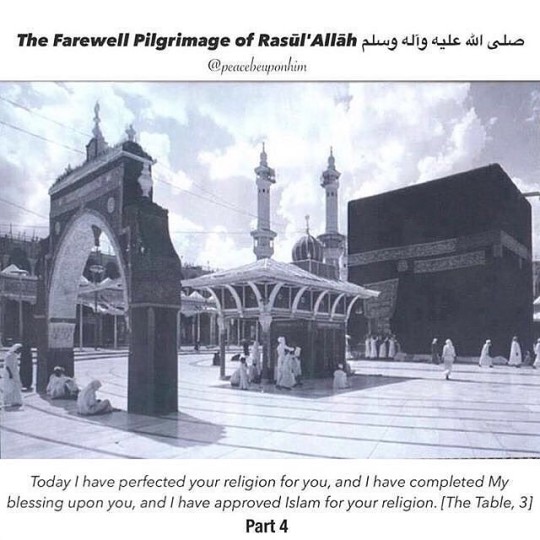
[READ THE THREE PREVIOUS POSTS]
_______________________________________
Then he ﷺ counselled the congregation, “Oh people! Have I delivered my message? Have I made clear my mission?” And from thousands of hearts have shouts of assent rose to the heavens, as the crowd called out “Yes you have, Oh Rasul'Allāh صلى الله عليه وآله وسلم,“ The Holy Prophet صلى الله عليه وآله وسلم raised his hands and to heaven to heaven and called Allah to witness, saying, “Oh my Lord bear witness!” ____________________________________ Then he continued, “Man kuntu mawlahu, fa-Aliyyun mawlahu” which is to say, “Whose close friend I am, his close friend Ali. Oh Allah, be the friend of him who is his friend, and the foe of him who is his foe, and aid him who gives aid to him.” ____________________________________ Then he ﷺ bade farewell to his nation, saying, “Let those who are present here inform those who are absent.” The Hajj company than entered Mecca, performed the Tawaf al-Widaa (the parting circumambulation), drank of the water of Zamzam well from the hand of Ibn ‘Abbas and thus completed the rites of the Hajj. Then the Holy Prophet صلى الله عليه وآله وسلم returned to Madinah. When the city of Madinah came into view, Prophet صلى الله عليه وآله وسلم felt such joy and elation at its sight that he ﷺ carried out with a loud shout:
____________________________________ LA ILAHA ILLALLAH, WAHDAHU LA SHARIKA LAH, LAHUL MULK WA LAHUL HAMD, WA HUWA ’ALA KULLI SHAY’IN QADIR. https://www.instagram.com/p/B1BfFf8Bfp6/?igshid=pndx11utnmo0
0 notes
Text
youtube
adkar | dua, La ilaha illallah wahdahu la sharika lahu New Voice
#اذكار#adkar#أدعية#لا اله الا الله وحده لا شريك له#اذكار الصباح والمساء#holy quran#99 names of allah#hadith of the day#hadees in english#hadees sharif#hadith qudsi#allah names#نور ذكر الله#علاج السحر#islam#tasbeeh#اذكار الصباح#اذكار المساء#لا اله الا الله#dua#la ilaha illallah#la ilaha illallah wahdahu la sharika lah#La ilaha illallah wahdahu la sharika lahu#الصباح#Youtube
0 notes
Text
youtube
#نور_ذكر_الله لا اله الا الله وحده لا شريك له adkar اذكار | أدعية هناك عدة أدعية و اذكار غير مخصصة لوقتٍ معين، هذه أدعية و الاذكار تصلح في أي وقتٍ أو زمنٍ ومن يتمسك يها فإنها تكون حماية له من الشرور ومن ضيق الصدر والهم والغم وكيد الشيطان فانصح اخوتي بالتمسك بها
قناة نور ذكر الله
ساعدنا علي الإستمرار في العطاء من خلال عمل مشاركة وكتابة تعليق و الاشتراك في قناة نور ذكر الله http://bit.ly/noorzhikrallah
لدعم القناة
https://www.patreon.com/noorzikrallah
لمزيد من الفيديوهات الإسلامية
اشترك معنا
https://goo.gl/zi8ZZF
#اذكار#adkar#أدعية#لا اله الا الله وحده لا شريك له#اذكار الصباح والمساء#holy quran#hadees in english#hadees sharif#hadith qudsi#allah names#نور ذكر الله#علاج السحر#islam#tasbeeh#اذكار الصباح#اذكار المساء#لا اله الا الله#dua#la ilaha illallah#la ilaha illallah wahdahu la sharika lah#La ilaha illallah wahdahu la sharika lahu#الصباح#ادكار#adkar ramadan#adkar arafat#ادعيه#لا إله إلا الله وحده لا شريك له 1000 مرة#la ilaha illallah wahdahu#Youtube
0 notes
Quote
لا إله إلا الله وحده لا شريك له له الملك وله الحمد يحيي ويميت وهو على كل شيء قدير"
A beneficial saying after the Fajr and Maghrib Prayers and is a reason to erase 10 enormous sins. And it was said that 10 special good deeds, and protects from sorcery and from harm. This Du^a' is to say:
[La ilaha illallah Wahdahu La Sharika Lah. Lahul-Mulku Wa Lahul-Hamd, Yuhiyy wa Yumeet Wa Huwa ^Ala Kulli Shay'in Qadir]
One should recite it 10 Times, after fajr prayer and Maghrib and before one moves from his place after his prayer.
0 notes
Text
*AAMALE ROZE AARAFA (9 ZILHUJJ)*
👉 It is highly recommended to fast on 9th Zilhajj.
👉Do Ghusl
👉 Recite Ziyarat e I.Hussain (as) of the Day of Aarafa
👉 *2 rkt Namaz after Namze Asr*
1st Rakat S.Alhamd & Sure Kulhovallah 1 time
2nd rakat S.Alhamd & Sure Kaferoon 1 time
👉 *4 rakat Namaz (2x2)*
In each Rakat Sure Alhamd 1 time & Sure Kulhovallah 50 times
👉Dua e Aarafa of I.Hussain (as)
👉Dua No 47 of Sahifa Kamila
👉 *Recite 100 times each of the following*
(a) Tasbeehate Arb'aa
(b) Sure Kulhovallah
(c) Ayatal Kursi
(d) Salawaat
👉 *Recite 10 times each*
(a) La ilaha illallah wahdahu la sharika lah, lahul mulko wa lahul hamd, yohyeey wa yomeeto and yomeeto wa yohyeey, wa huwa hayyul la yamoot, be yadehil khair, wa huwa ala kulle shayin qadeer
(b) Astaghfirullahal laze la ilaha illa huwal hayyul qayyoom, wa atubo ilaih
(c) Ya Allahu
(d) Ya Rahmaano
(e) Ya Raheemo
(f) Ya Badee’-as Samaawate Wal Arze Ya Zaljalale wal Ikram –
(g) Ya Hayyo Ya Qayyum
(h) YA Hannano Ya Mannan
(i) Ya lailaha illa anta
(j) Aameen
Then submit your needs and they will be granted, inshallah.
*🙏🏼 Pray for the early reappearance of Imam e Zamana (atfs)*
👉Recite Dua-e-Asharaat
For details of aamal go to www.duas.org
Divine Pearls
Raaz o Nyaz app
(Ref. Mafateehul Jinaan)
0 notes
Text
youtube
adkar | dua, La ilaha illallah wahdahu la sharika lahu New Voice
#اذكار#adkar#أدعية#لا اله الا الله وحده لا شريك له#اذكار الصباح والمساء#holy quran#99 names of allah#hadith of the day#hadees in english#hadees sharif#hadith qudsi#allah names#نور ذكر الله#علاج السحر#islam#tasbeeh#اذكار الصباح#اذكار المساء#لا اله الا الله#dua#la ilaha illallah#la ilaha illallah wahdahu la sharika lah#La ilaha illallah wahdahu la sharika lahu#الصباح#Youtube
0 notes